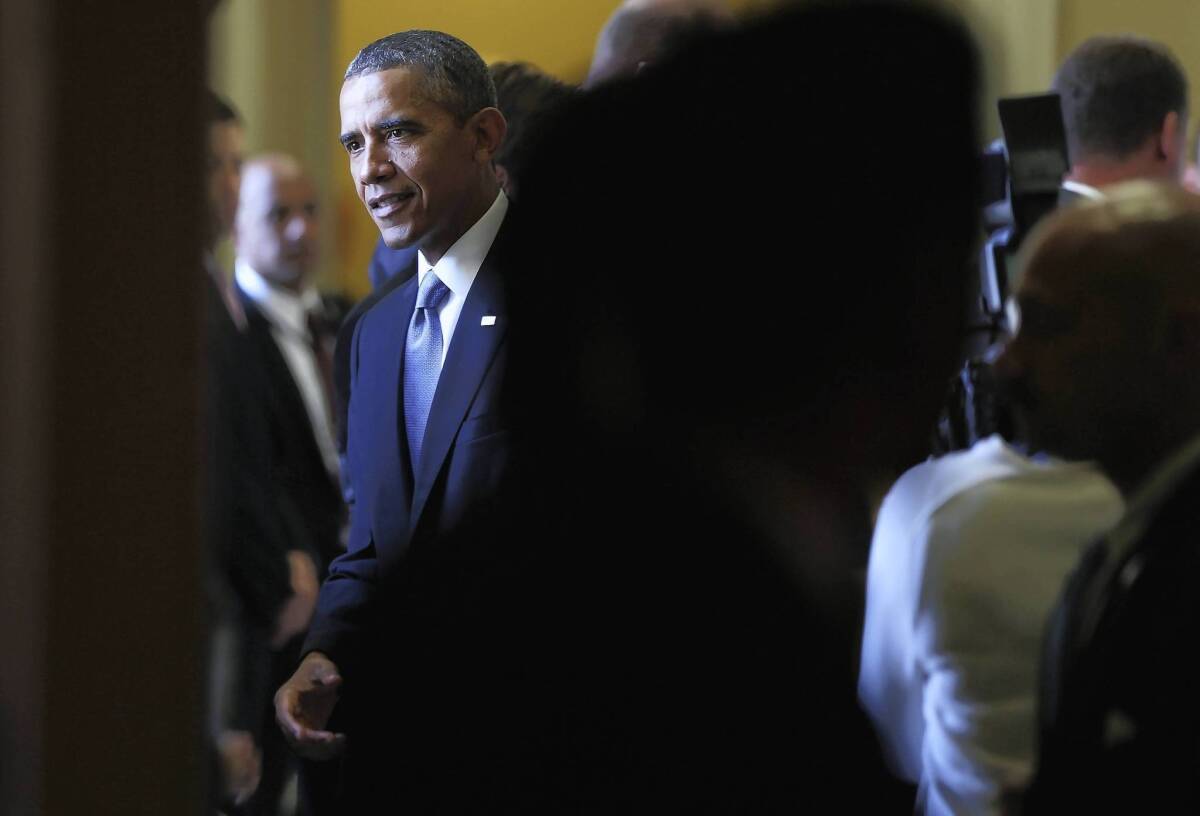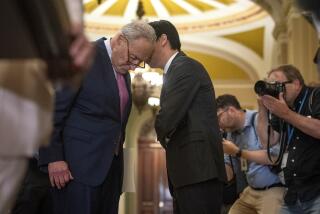Obama’s team calls a timeout

- Share via
WASHINGTON — As the White House announced this week it had canceled the annual congressional picnic, officials said the decision had nothing to do with the administration’s frustration with Congress.
After a week in which President Obama narrowly averted a bruising defeat on Capitol Hill over a military strike on Syria, the decision had the feeling of a much-needed timeout.
The messy debate over a resolution to authorize military force put a harsh light on the president’s already rocky relationship with Congress.
Despite a charm offensive earlier this year, complete with intimate dinners and phone calls, Obama faced contrary lawmakers in both parties, a climate that is certain to persist through the next round of legislative fights, if not to the end of his second term.
In deciding to seek approval for military action, Obama banked on the long-standing deference to the commander in chief on matters of national defense. But by the time he pressed “pause” on the intense White House lobbying effort, he was finding as much defiance as deference.
Although the White House cast the issue as a matter of national security and a crucial test of U.S. power, dozens of lawmakers from both parties were set to deliver a rare rebuke to a president on foreign policy. Even Democratic loyalists seemed unswayed by appeals to preserve the prestige of the presidency — and this president. Hawkish Republicans offering to reach across the aisle to support the president said they found the White House distant and uninterested.
The canceled picnic punctuated a week of aggravated feelings.
“We obviously have divided government. We have sometimes contentious, sometimes very effective relations with Congress. But we keep at it,” said White House spokesman Jay Carney, who denied the picnic cancellation had anything to do with the state of relations between the two branches of government.
On Capitol Hill, the week’s episode strained Obama’s traditional alliance with his fellow Democrats, many of whom were wary of another military involvement, unclear about the president’s plans for a missile strike and surprised by his decision to ask them to vote on it.
“Not only was it a hard ask, but it was not a well-prepared ask,” said Sen. Sheldon Whitehouse (D-R.I.). “His willingness to back away from the ultimatum and pursue the disarmament proposal was extremely welcome, and I think that helped all of us in our relationship with him.”
Obama’s relationship with his Republican critics was not helped. As lawmakers look ahead to the rest of the fall agenda, including the coming budget battles, the administration’s performance this week will not be easy to forget, some said.
“It’s just more lack of confidence that they know what they’re doing,” said Sen. Tom Coburn (R-Okla.).
“There’s only so much political capital,” said Sen. Rob Portman (R-Ohio).
Democrats defended the president, blaming Republicans for a “knee-jerk” opposition to any initiative tied to this White House, a phenomenon that Obama aides regularly cite but that the president appears to have disregarded in his decision to put a use-of-force resolution before Congress.
“Historically, when it comes to military force, Republicans and conservatives have led that. Now they’re opposed to it,” said Sen. Richard J. Durbin (D-Ill.). In a private meeting this week, Durbin said, Obama himself joked that “a lot of Republicans on Capitol Hill are discovering their inner doves on Syria.”
The next set of negotiations will be far more predictable and on familiar territory. By the end of the month, the president and Congress must agree on a plan to continue funding the government, or it will shut down. And by mid-October, they will have to agree to raise the debt limit, or risk a default.
The White House has said it won’t negotiate on the debt limit, as it did twice before, counting on the public and business groups to pressure Republicans.
Democrats were hopeful the budget issues would put the White House back on more solid political footing.
“I think the public has a heck of a lot more confidence in the president on economics and budget than [in] the House Republicans,” said Sen. Carl Levin (D-Mich.).
That may be wishful thinking, said Ross Baker, a political science professor at Rutgers University, who studies the Senate.
“These things carry over. There’s no firewall between issues,” he said. “Failure in one area leads to problems in other areas.”
The debate over the war in Syria may be on an extended pause, although prospects of Obama returning to Congress to ask for a use-of-force authorization seem slim.
A bipartisan group of senators is drafting an amended authorization, but the group is not expected to fully air its proposal until diplomatic talks conclude.
There were some signs that the debate may have won the president some empathy, if not support. At a private lunch with Republican senators this week, Obama asked them not to undermine him on the world stage. Sen. Ron Johnson of Wisconsin, who is part of a group of GOP senators working with the White House on fiscal issues, said the appeal resonated.
“These issues aren’t going away. President Obama is president for another three years,” Johnson said. “I don’t envy him the task. But he is president — he’s the commander in chief — he wanted the job.”
kathleen.hennessey@latimes.com
Michael A. Memoli in the Washington bureau contributed to this report.
More to Read
Sign up for Essential California
The most important California stories and recommendations in your inbox every morning.
You may occasionally receive promotional content from the Los Angeles Times.
















